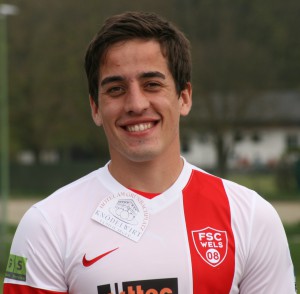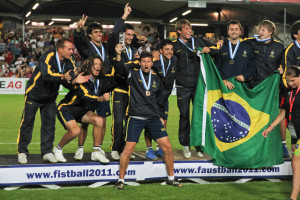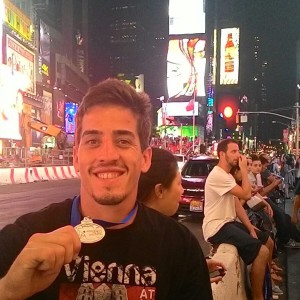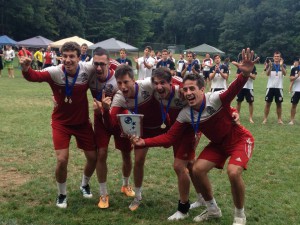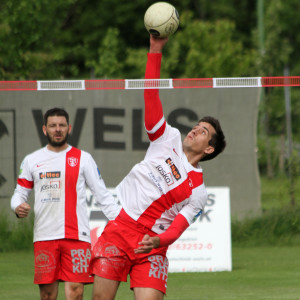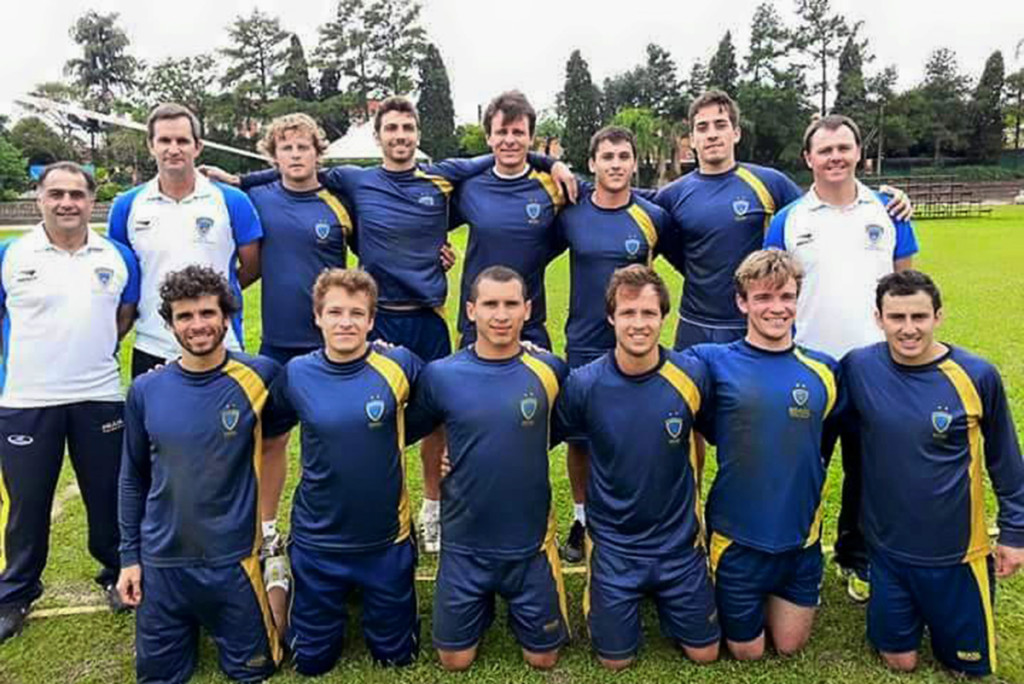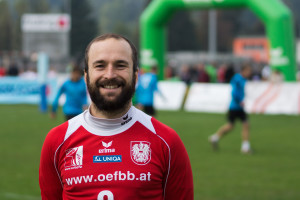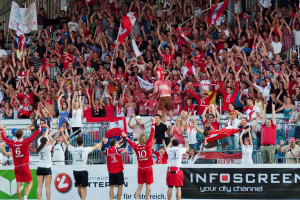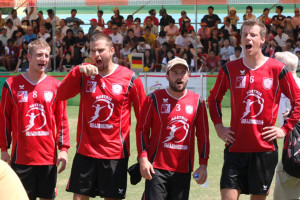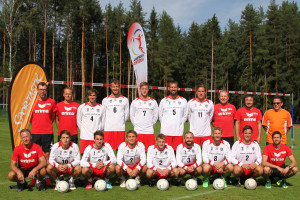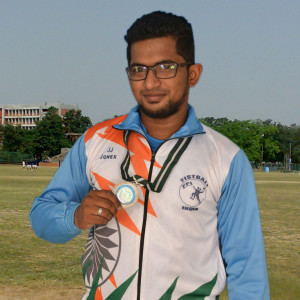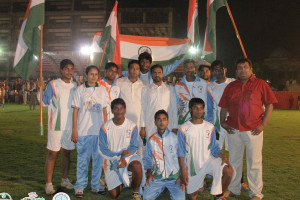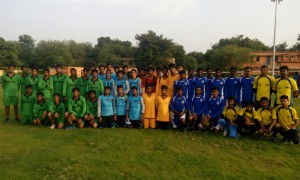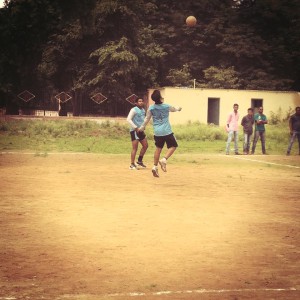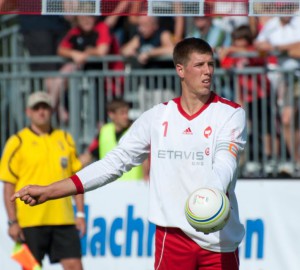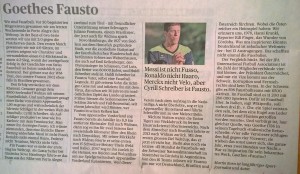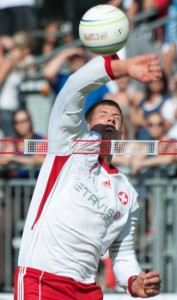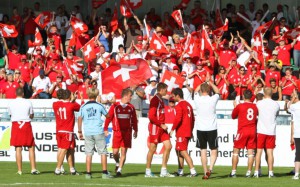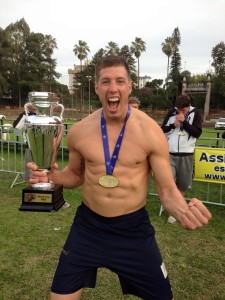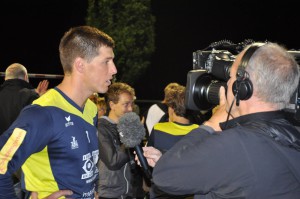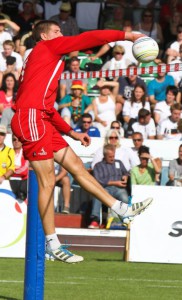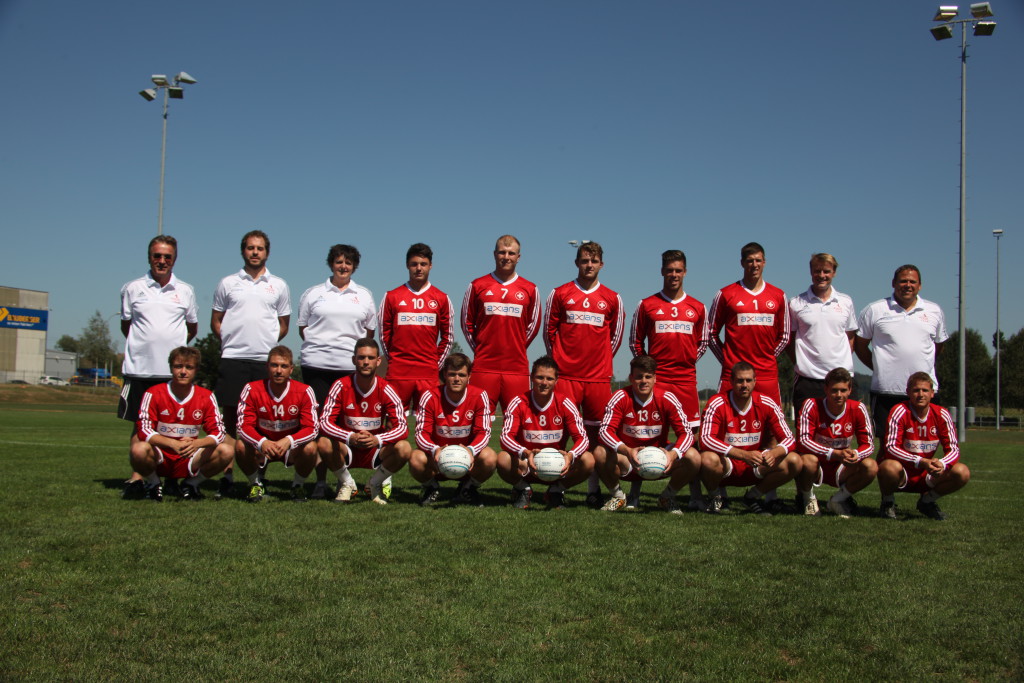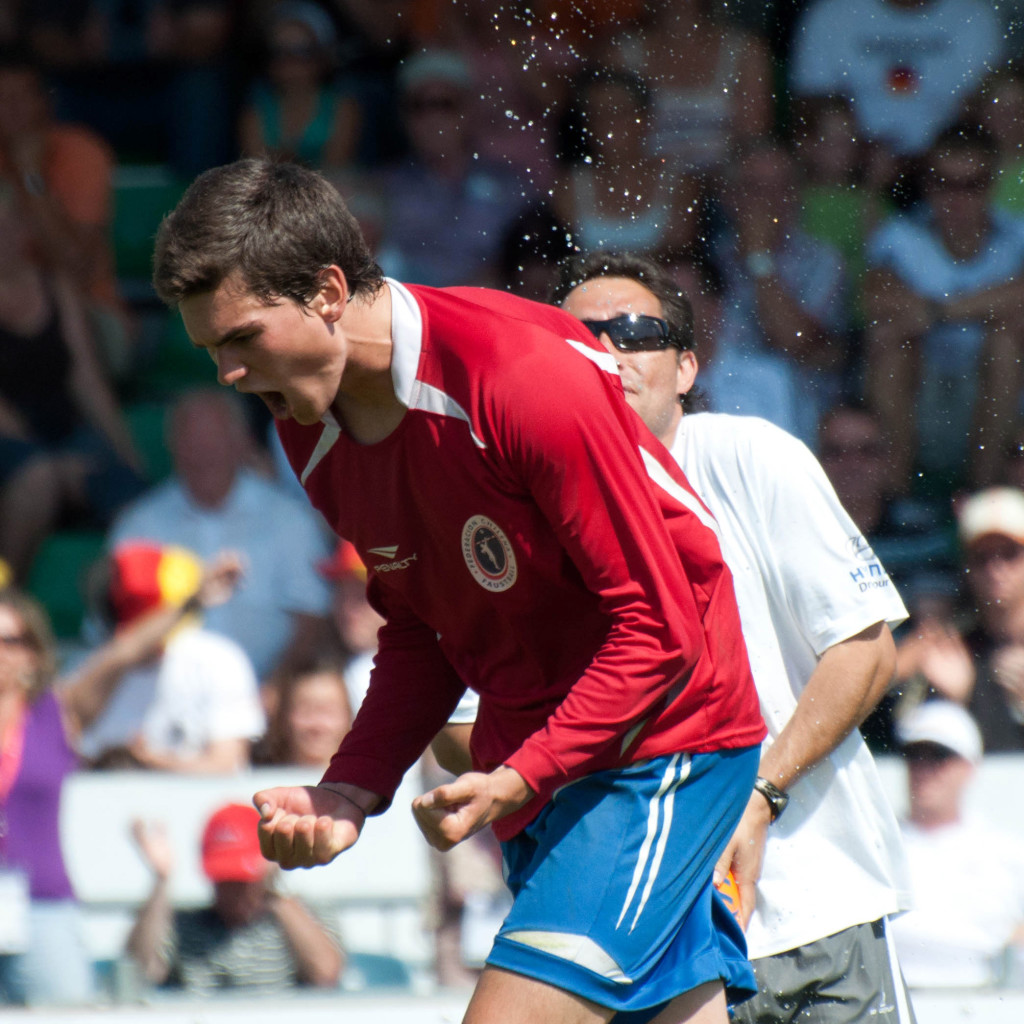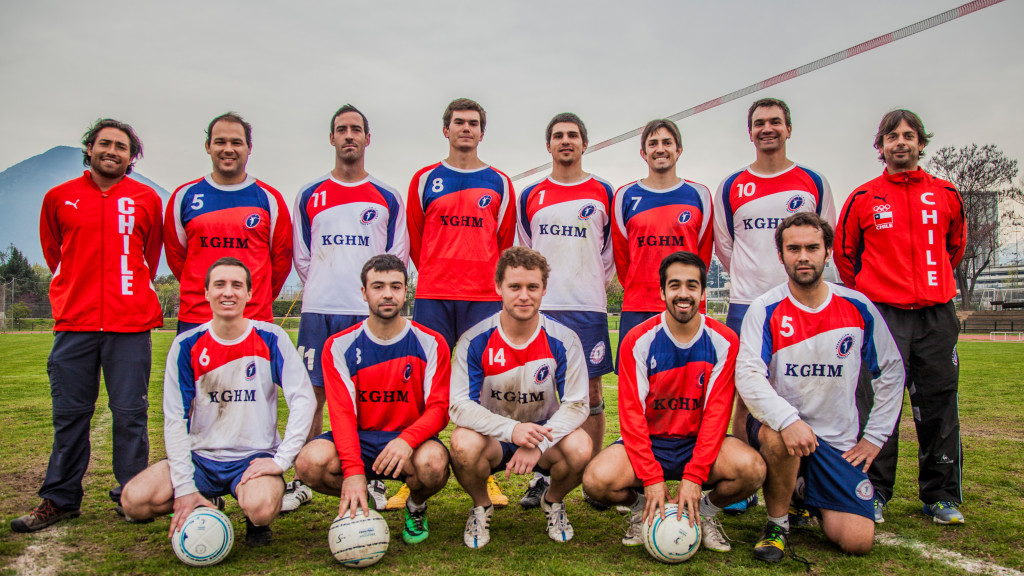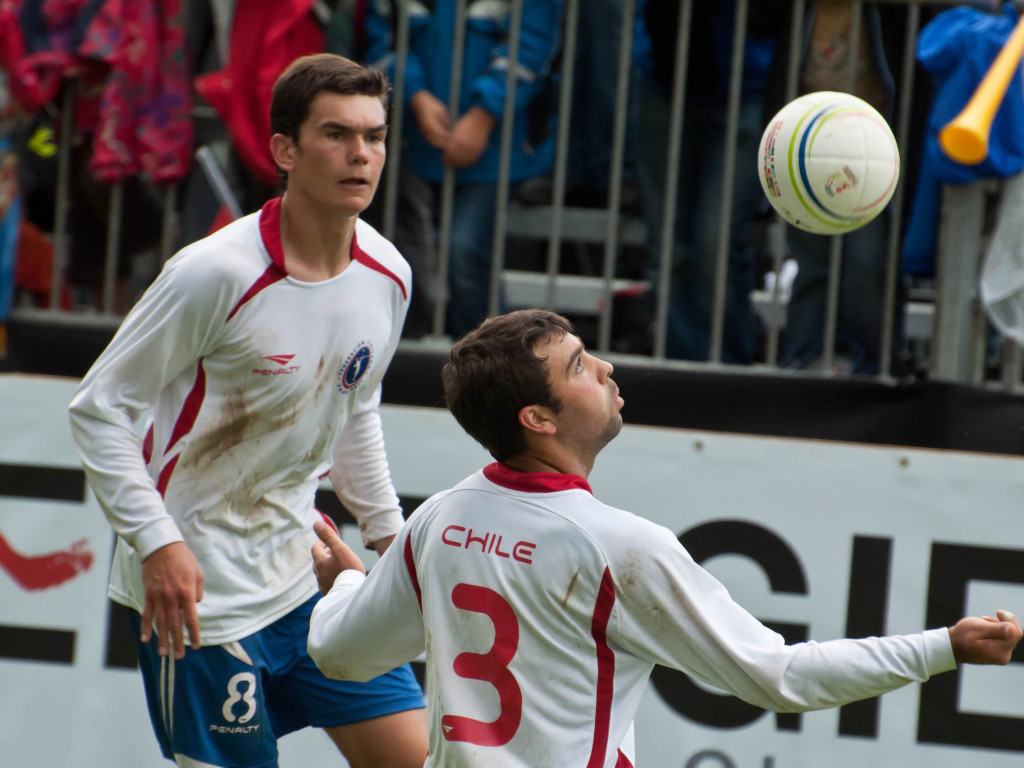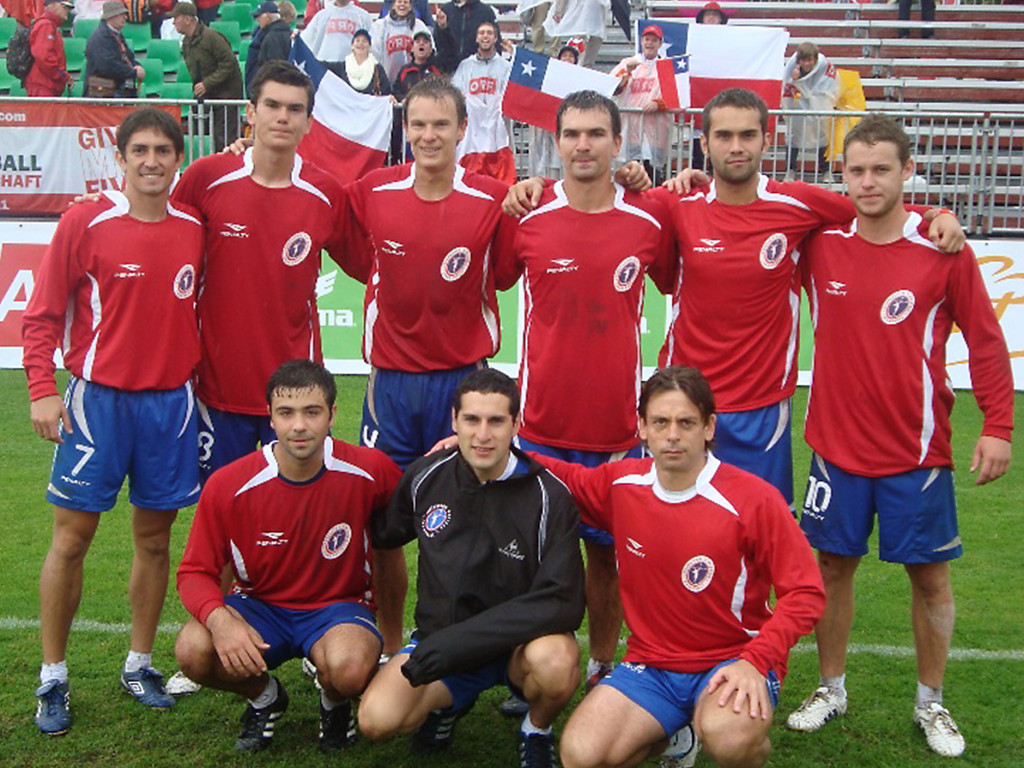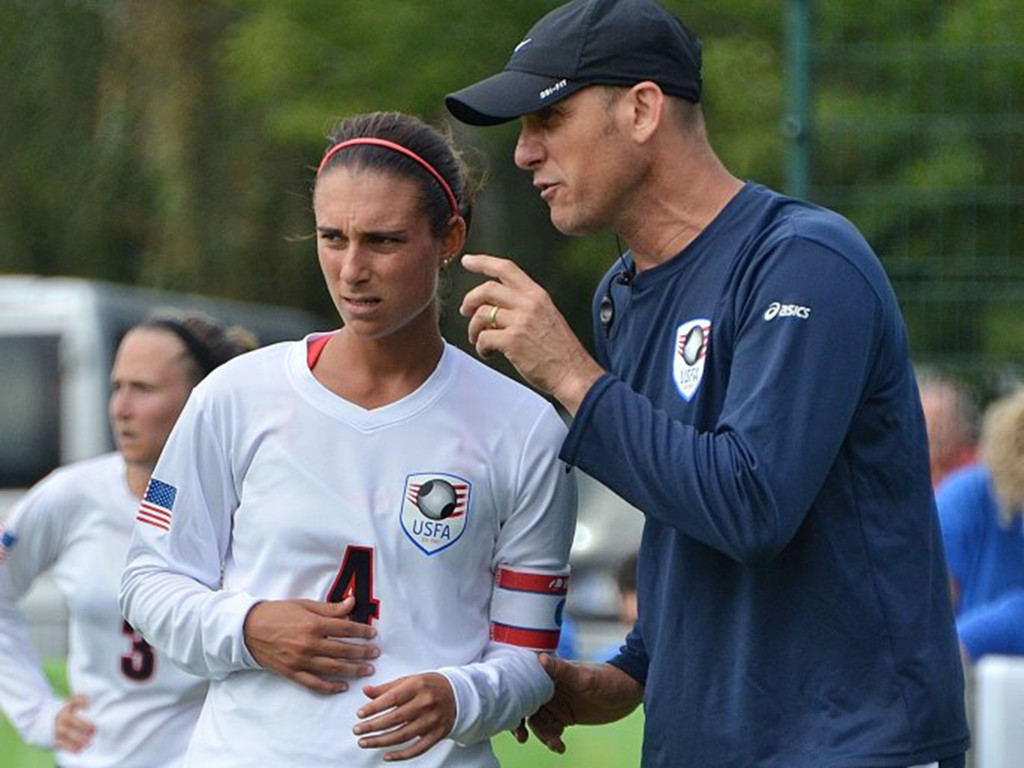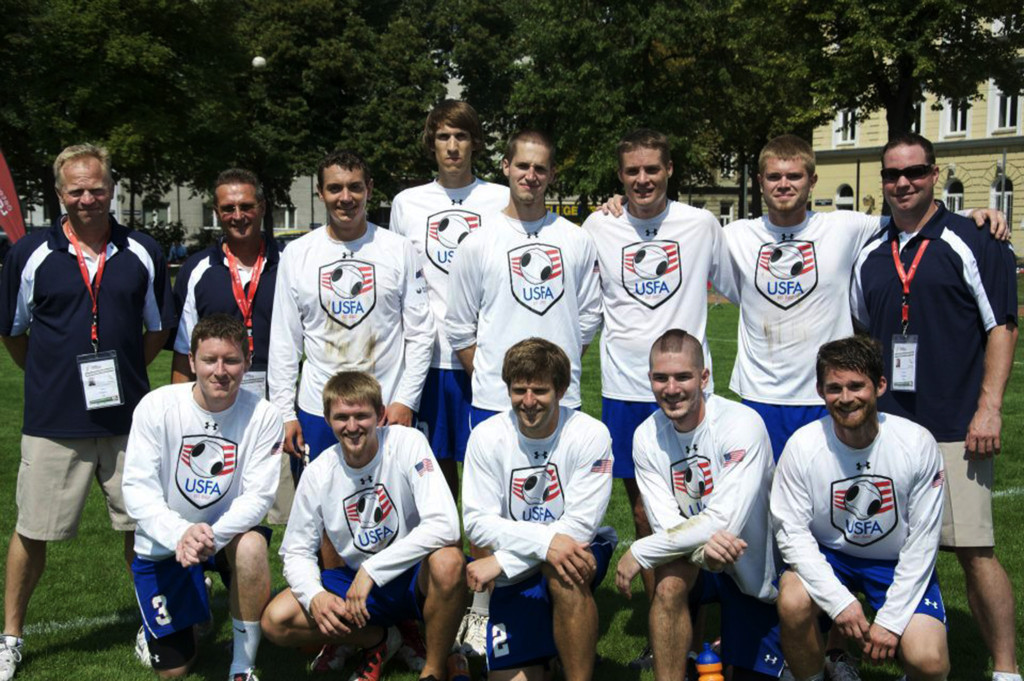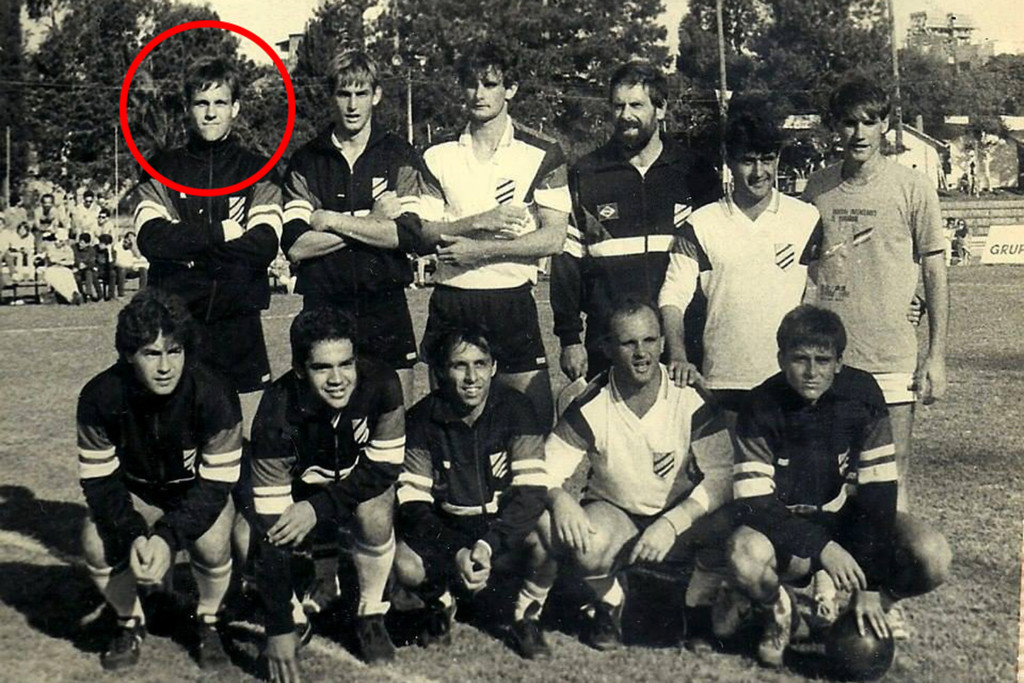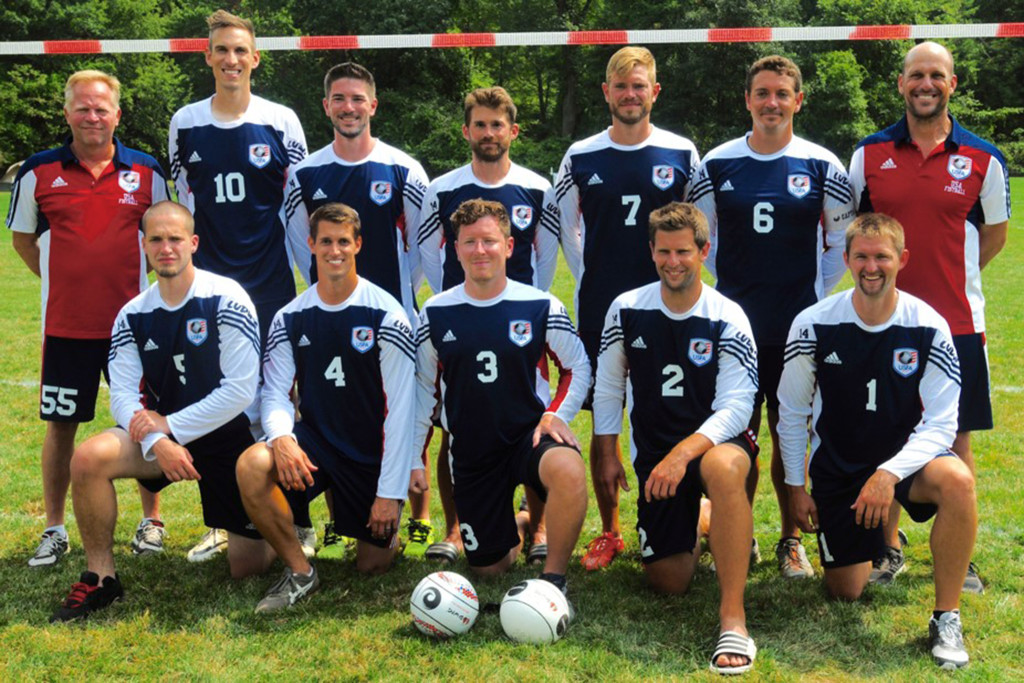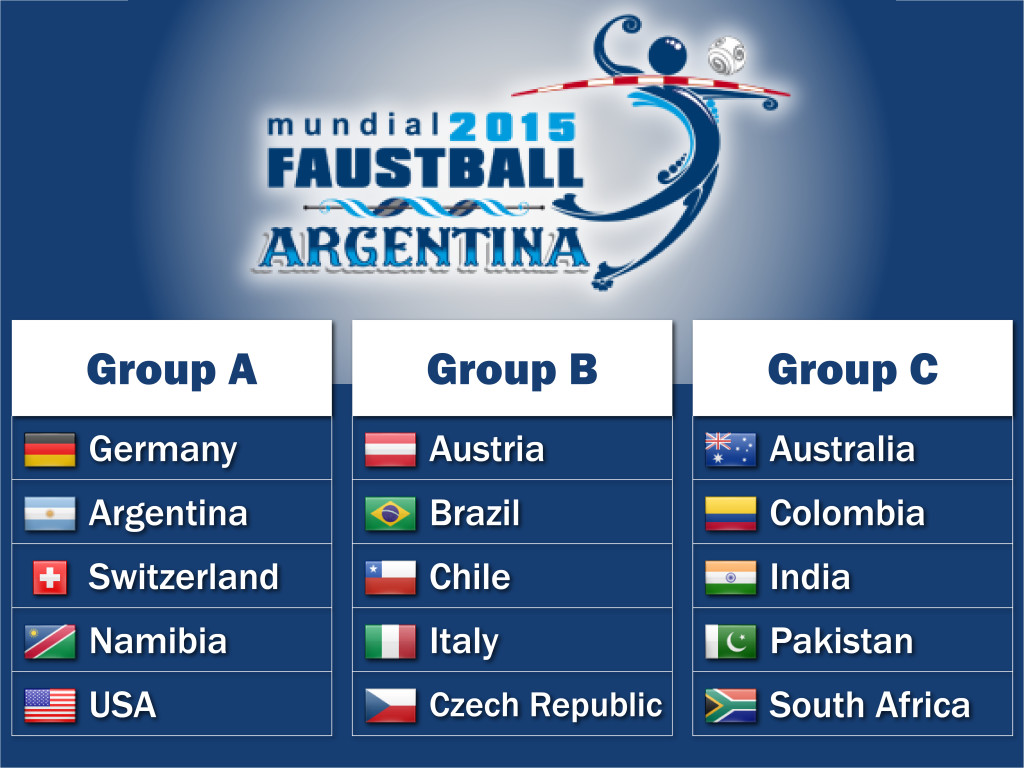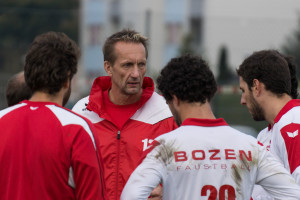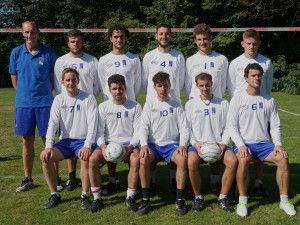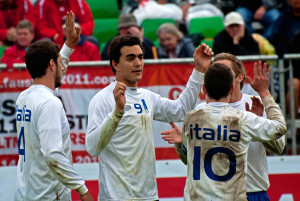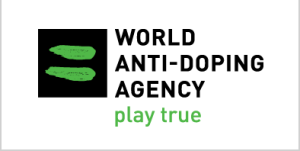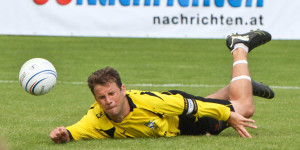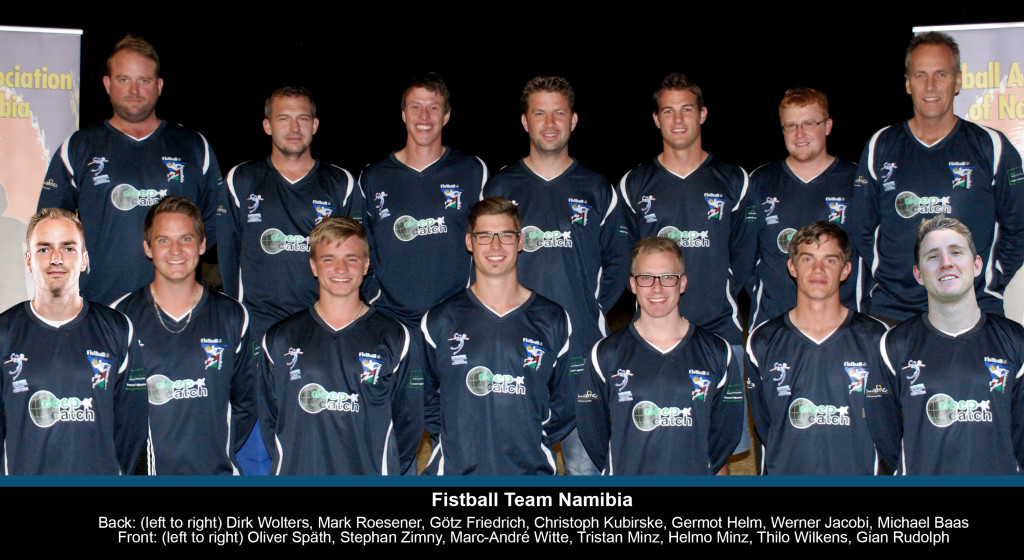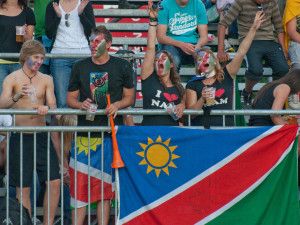ENGLISH VERSION BELOW
VERSÃO PORTUGUÊS ABAIXO
„Ich kann es kaum erwarten alles für mein Land zu geben!“
Der jüngste der drei Andrioli Brüder, Jayme, ist der einzige der bei der WM 2015 für sein Geburtsland am Start ist. Der 21-jährige Fitness Instruktor spricht über das Aufeinandertreffen in der Vorrunde mit seinem Bruder Jean, aktuelle Entwicklungen in Brasilien und warum er sich wie ein echter Sportprofi fühlt wenn er in der österreichischen Liga spielt.
IFA: Hallo Jayme, mit Brasilien hat du im August den Titel bei den ersten Pan American Games in New Jersey gewonnen. Wie waren deine Eindrücke von diesem Turnier?
Jayme Andrioli: Ich war vorher noch nie in den USA, es war also schon etwas Besonderes für mich, das Land ist wirklich sehr cool. Auch das Turnier war toll organisiert und alle fünf teilnehmenden Nationalteams haben sich spielerisch stark verbessert gezeigt. Vor allem die US-Herren sind ein harter Gegner geworden, nachdem sie jetzt zwei Jahre lang von Gastão Englert trainiert wurden. Es ist so etwas wie eine “Faustball Revolution” in Amerika im Gange.
IFA: Bei euch wird Faustball schon sehr lange gespielt, wie siehst du die sportliche Zukunft des Faustballsports in Brasilien?
Jayme: Im Moment sind in etwa 20 Vereine aktiv und die meisten haben sehr junge Spieler bereits in die Wettkampfmannschaft integriert. Diese Spieler sind nun teilweise auch schon im
Nationalteam dabei, bei dem derzeit ein Generationenwechsel im Gang ist. Von der Mannschaft die 2011 am Start war sind nur noch vier Spieler übrig. Wir haben ein sehr talentiertes und erfolgshungriges Team.
IFA: Du bist ja auch erst 21 Jahre alt und schon zum zweiten Mal dabei.
Jayme: Ja, das stimmt. In Österreich 2011 war ich als damals 17-jähriger im Kader. Ich habe die Atmosphäre bei den Spielen genossen aber nicht sehr viel Einsatzzeit bekommen. Dieses Mal bin ich einer der Schlüsselspieler im Angriff und es lastet mehr Druck auf meinen Schultern.
IFA: Du hast im vergangenen Jahr auch in der österreichischen Liga gespielt, was sind da die größten Unterschiede zwischen Faustball in Österreich und Faustball in Brasilien?
Jayme: Der größte Unterschied ist mit Sicherheit der Modus der Liga. In Österreich kannst du Woche für Woche gegen die besten Teams des Landes spielen. In Brasilien müssen wir beispielsweise 700km zurücklegen um gegen SOGIPA Porto Alegre spielen zu können, das geht dann eben nicht so oft. Was ich an Österreich auch noch toll gefunden habe ist der Umstand, dass bei jedem Top-Spiel auch in den kleineren Städten wie Freistadt, Kremsmünster und Grieskirchen sehr viele Zuseher vor Ort sind. Wenn man da aufs Feld kommt fühlt man sich als wäre man ein vielumjubelter Sportprofi, das ist echt cool.
IFA: Also du würdest gerne wieder zurück nach Österreich?
Jayme: Ja das würde ich sogar sehr gerne, aber immer wenn ich nach Europa fliege muss ich mein Leben in Brasilien für ein halbes Jahr stoppen. Ich habe hier meine Freundin, die Familie und einen Job, das ist alles nicht so einfach.
IFA: Dieses Jahr findet die Weltmeisterschaft wieder in Südamerika statt, was sind deine Erwartungen für das Turnier, auch in Bezug auf die letzte WM in Österreich?
Jayme: Die Weltmeisterschaft 2011 war großartig, so viele Menschen und richtig tolle Stimmung das wird schwer zu toppen sein. Ich denke nicht, dass in Argentinien so viele Menschen kommen werden. Aber ich bin mir sicher, dass es ein bestens organisiertes Event sein wird und dann werden wir sehen, wie es die Menschen vor Ort annehmen werden, das weiß keiner von uns so genau.
IFA: Bei der WM kommt es zum Duell mit deinem Bruder Jean, der nun für Österreich spielt. Wie schätzt du da eure Chancen ein?
Jayme: Gegen den eigenen Bruder zu spielen ist immer etwas Besonderes. Ich weiß noch nicht wie ich mich fühlen werde wenn wir uns auf dem Feld gegenüberstehen, aber es wird sicher ein aufregendes Spiel mit uns beiden im Angriff. Ich habe so viel von ihm gelernt, ich bin ein echter Fan von Jean.
IFA: Was sind nun eure Ziele für die Weltmeisterschaft?
Jayme: Wir wollen den Titel gewinnen, keine Frage. Weil wir so ein junges Team sind ist es vielleicht nicht das was die Fans von uns erwarten, aber ich denke wir können es schaffen. Das Finale zu erreichen wäre schon eine schöne Geschichte.
IFA: Wie sehen jetzt noch die letzten Vorbereitungen der brasilianischen Mannschaft aus?
Jayme: In den letzten Wochen haben wir an wechselnden Schauplätzen hart gemeinsam trainiert. Jeder im Team ist höchst motiviert und alle ziehen an einem Strang um unser Ziel zu erreichen. Ich kann es kaum erwarten in Córdoba zu spielen und alles für mein Land zu geben.
===============
VERSÃO PORTUGUÊS
Entrevista Jayme Andrioli – atacante, Brasil
ENGLISH VERSION BELOW
O mais novo dos três irmãos Andrioli, Jayme é o único que está jogando pelo seu país de nascimento. É muito provável que ele enfrentará seu irmão em campo na Argentina, Jean, que agora joga pela seleção da Áustria. Com 21 anos de idade, professor de musculação, ele nos conta um pouco de como é jogar com seu irmão e o porque ele se sente como um atleta profissional quando está jogando na Áustria.
IFA: Oi Jayme, com seu clube do Brasil você ganhou o título do 1º Jogos Pan-americanos em Nova Jersey no mês de agosto. Qual foi sua impressão desta competição?
Jayme Andrioli: Eu nunca estive antes nos Estados Unidos, foi muito especial e eu gostei bastante do país. O campeonato foi bem organizado e todos as equipes dos 5 países mostraram um ótimo desempenho, cada país em um nível de evolução, algo como ‘’evolução do punhobol’’ nas américas. Especialmente a equipe masculina dos Estados Unidos que tem se mostrado cada vez mais forte depois de 2 anos de trabalho do técnico brasileiro, Gastão Englert.
IFA: Brasil tem uma longa tradição jogando este esporte, o que você pode falar sobre o recente desenvolvimento em seu país?
Jayme: Nós somos hoje cerca de 20 clubes e a maioria dos clubes tem jogadores muitos jovens, uma nova geração que está chegando. Na seleção brasileira também temos 6 atletas com aproximadamente de 22 anos de idade. Então, realmente temos muitos novos talentos no punhobol do Brasil.
IFA: Você tem apenas 21 anos de idade, mas já esta indo para seu segundo campeonato mundial.
Jayme: Eu joguei o campeonato mundial na Áustria quando tinha 17 anos, aproveitei muito a atmosfera, aprendi muito, mas não tive um papel tão importante dentro de campo. Neste ano, acredito que vou ser mais útil e com mais responsabilidade para ajudar a seleção.
IFA: Você jogou na Liga da Áustria por um ano, qual é a maior diferença entre o punhobol no Brasil e na Áustria?
Jayme: A maior diferença é o sistema de disputa. Na Áustria você pode jogar contra as melhores equipes do país toda semana porque a distância entre as cidades é pouca. Aqui no Brasil nós temos que viajar 700km de Curitiba a Porto Alegre ficando impossível fazer isso com tanta frequência por questões financeiras. Outra coisa que eu gostei em ter jogado na Áustria é que os jogos sempre estão com bastante público assistindo, especialmente em cidades menores como Freistadt, Grieskirchen e Kremsmünster. Você se sente como um atleta profissional quando está em campo, isso é ótimo.
IFA: Você gostaria de voltar para a Áustria um dia?
Jayme: Sim eu gostaria de fazer isso, mas você sabe, toda vez que viajo para Europa é preciso deixar família, namorada e parar o trabalho por meio ano. Então, isso acaba não sendo tão fácil.
IFA: O Campeonato Mundial está de volta na América do Sul, quais suas expectativas para o evento ‘’em casa’’, especialmente quando você pensa sobre o último Mundial?
Jayme: O Campeonato Mundial na Áustria em 2011 foi realmente grande e cada jogo era uma estrutura incrível, eu acho que na Argentina não haverá um grande público assistindo como na Áustria, mas acredito que eles serão bons receptores deste grande evento, temos que esperar pra ver como as pessoas irão reagir sobre o Mundial, ninguém consegue prever isso ainda.
IFA: É muito provável que você irá enfrentar seu irmão Jean, que agora joga pela Áustria. Como você classifica suas chances neste duelo de família? Qual seu objetivo para o Campeonato Mundial?
Jayme: Nós queremos ganhar o título, talvez não seja essa a expectativa das pessoas, principalmente por sermos uma jovem equipe com novas caras, mas nós podemos fazer isso. Jogar contra seu irmão é sempre especial, não sei exatamente qual a sensação, mas nós dois somos bons atacantes, em diferentes fases do esporte, sou fã e sempre me espelhei muito nele. Sem dúvidas, será um jogo interessante.
IFA: Conte-nos um pouco sobre sua preparação final para seu segundo Campeonato Mundial?
Jayme: No último mês nós tivemos treinos em vários finais de semana em diferentes cidades. Todos os 10 jogadores estão focados no Mundial. Estamos fechados em busca do nosso objetivo. Mal posso esperar para entrar em campo em Córdoba e ajuda o Brasil em tudo que eu puder.
===============
ENGLISH VERSION
Interview with Jayme Andrioli – Striker, Brazil
“I can’t wait to give everything I have for my country.”
As the youngest of the three Andrioli brothers, Jayme is the only one playing for their country of birth. In the group stage he faces his brother Jean, who plays for Austria now, in Argentina. The 21-year-old fitness instructor tells us about the strange feeling when playing your brother at the World Cup and why he feels like a pro when entering the pitch in Austria.
IFA: Hello Jayme, with Team Brazil you won the title at the 1st Pan-American games in New Jersey back in August. What were your impressions of the tournament?
Jayme Andrioli: I have never been to the USA before, so it was very special for me and I liked the country a lot. The tournament was well organised and all the teams from five nations showed an improved performance, there is some kind of “fistball evolution” going on in America. Especially the US Men’s Team are hard to beat now after two years of being coached by Gastão Englert.
IFA: Brazil has a long tradition in playing the sport, what can you tell about the recent developments in your country?
Jayme: We have about 20 clubs right now and the most teams have very young players, so there is a new generation of fistball coming. And in the national team there are also six newcomers that are around 22 years old. We really have a lot of talented fistball players in our country.
IFA: You are also just 21 years old, but it is already you second World Cup appearance for Team Brazil.
Jayme: Yes that’s right, I played at the World Championship in Austria when I was 17, I enjoyed the atmosphere but didn’t get that much of playing time. This year I’m one of the key players so there will be more pressure on me.
IFA: You played in the Austrian League for a year, what is the main difference between fistball in Brazil and fistball in Austria?
Jayme: The biggest difference is the league system. In Austria you can play against the best teams almost every week because the distance between the clubs is not that big. And here in Brazil we have to travel 700km from Curitiba to Porto Alegre, so it’s impossible to do this every weekend due to financial reasons. Another thing I liked about playing in Austria is that there were so many people watching, especially in the smaller cities like Freistadt, Grieskirchen or Kremsmünster. You feel like a professional sportsmen when you enter the pitch, that’s very nice.
IFA: So you would like to come back to Austria one day?
Jayme: Yeah, I would like to do it, but you know, every time I fly over to Europe I have to stop my life here in Brazil for half a year. I have my girlfriend, my friends and my job here so it’s not that easy.
IFA: The World Cup is back in South America, what are your expectations for the event “at home”, especially when thinking about the last World Cup?
Jayme: The World Championship in Austria 2011 was really big and there was a huge crowd at every game, I don’t think that there are as many people watching the games in Argentina. I think they will be good hosts for the big event, but we have to see how the people react to the World Cup, nobody knows it yet.
IFA: In the group stage you will face your brother Jean, who plays for Austria now. How do you rate your chance in this family clash? What is your goal for the World Championships?
Jayme: We want to win the title, it’s maybe not what the people are expecting because we have such a young team but I think we can do it. Playing against your brother is always special, I’m not sure about how I will feel, but as we are both good strikers I expect an exciting game. I learned so much from him. I’m really a fan of Jean. It’s going to be an interesting matchup.
IFA: Give us an outlook on the final preparations for your second World Cup participation.
Jayme: The last month we had training camp every weekend in different cities. Everybody on the team is focused on the World Cup and we are pulling together to reach our goal. I can’t wait to enter the field in Córdoba and give everything I have for my country.


 English
English